|
Reprinted with
permission of Life Extension®
|
|
 Nutrients That Help Prevent Prostate Cancer Nutrients That Help Prevent Prostate Cancer
A 2021 study found
that certain foods exert protective effects
against prostate cancer.
By Michael Downey.
|
|
An
estimated 268,000 American men will be diagnosed with prostate cancer during 2022.1 prostate cancer during 2022.1
Most
men with cancer cells in their prostate gland
are unaware of it.
Ingesting foods with anti-cancer activities,
while avoiding foods that promote cancer
propagation may:
-
Lower risk of developing prostate cancer,
-
Reduce need for aggressive therapies in
those with low-grade disease, and
-
Improve clinical outcomes in those treated
for prostate cancer.
A
2022 meta-analysis found that meat, especially
processed meat, may be associated with increased
prostate cancer risk.2
Another recent study found that a high
consumption of vegetables, fruits, and whole
grains is strongly linked to protective effects
against prostate cancer.3
Previous research has shown that specific foods
can reduce prostate cancer risk and improve
outcomes in those following an active
surveillance (watchful waiting) program or
undergoing curative treatment.
Diet, Nutrients, and
Prostate Cancer
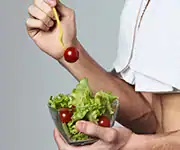 About one in eight men
will be diagnosed with prostate cancer during
his lifetime.1 About one in eight men
will be diagnosed with prostate cancer during
his lifetime.1
However, regular consumption of certain foods is
associated with lower rates of prostate cancer.
By boosting intake of the following foods, men
may significantly lower their risk.
|
Walnuts
Feeding walnuts to mice inhibits the development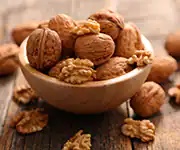 of tumors and decreases tumor growth and size. It also lowers levels of IGF-1
(insulin-like growth factor 1), a protein
associated with prostate cancer.4
of tumors and decreases tumor growth and size. It also lowers levels of IGF-1
(insulin-like growth factor 1), a protein
associated with prostate cancer.4
Other
animal and cell culture research shows that
walnuts:5,6
-
Inhibit the growth of prostate cancer cells,
-
Lower PSA (prostate-specific antigen)
levels, which may indicate prostate cancer
when elevated, and
-
Reduce the size of prostate tumors.
In
older men, walnut intake improved biomarkers
related to prostate and vascular health.4
Cruciferous
Vegetables
Observational studies have found that men with a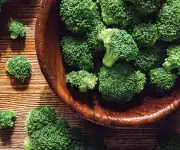 high consumption of broccoli and other cruciferous vegetables like cabbage,
cauliflower, and kale have a lower risk of
invasive prostate cancer.7,8
high consumption of broccoli and other cruciferous vegetables like cabbage,
cauliflower, and kale have a lower risk of
invasive prostate cancer.7,8
A
meta-analysis concluded that cruciferous
vegetable intake is associated with an overall
reduced risk of prostate cancer. 9
These
effects may be a result of cruciferous
vegetables’ abundance of beneficial compounds,
including:10-14
-
Glucosinolates,
-
Indole-3-carbinol (I3C),
-
3,3’-diindolylmethane (DIM), and
-
Phenethyl isothiocyanate (PEITC).
|
|
Flaxseed
In human studies,
flaxseed intake has been shown to:
15 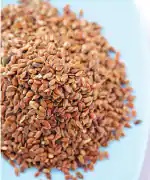
-
Decrease
proliferation of prostate cancer
cells, and
-
Reduce
proliferation of tumors in as few as
30 days.
Flaxseeds contain
lignans, which are converted in the body
into compounds called enterolactones.16
Men with higher
levels of enterolactones have been shown
to be less likely to have prostate
cancer than men with low levels.17
Coffee
A meta-analysis
found that consuming four or more cups of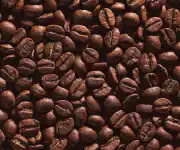 coffee daily was linked to a reduced risk of fatal and high-grade
prostate cancer, as well as a lower risk
of overall prostate cancer.18 coffee daily was linked to a reduced risk of fatal and high-grade
prostate cancer, as well as a lower risk
of overall prostate cancer.18
Additionally, a
large epidemiological study found that,
compared to drinking no coffee, drinking
six cups of coffee (including
decaffeinated) daily reduced the risk of
prostate cancer by 18% and lowered the
risk of lethal prostate cancer by 60%.19
Tomatoes
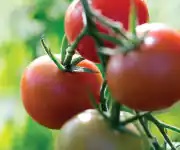 Lycopene is the
carotenoid pigment that gives tomatoes
their red color. Lycopene is the
carotenoid pigment that gives tomatoes
their red color.
A systematic
review of cell and animal studies found
that lycopene decreases androgen
metabolism and signaling, an important
factor in prostate cancer growth and
progression. 20
Additional
anti-cancer mechanisms of lycopene are
believed to include inhibiting
inflammation and reducing oxidative
stress within prostate tissue. 21
Lycopene is known
to inhibit the growth of prostate cancer
cells in vitro, and higher circulating
levels have been associated with reduced
prostate cancer risk.22,23
Above-average consumption of lycopene
has been tied to a 59% reduction in the
risk of death from aggressive prostate
cancers.24
|
A meta-analysis
found a significant association between
a lower risk of prostate cancer and
consumption of tomatoes, cooked
tomatoes, and tomato sauce. The greater
the tomato consumption, the greater the
risk reduction.25
To enhance the
absorption of lycopene from tomatoes,
eat them in processed form such as
tomato sauce, or process them yourself
by cooking and eating them with healthy
fat, such as extra virgin olive oil.26,27
|
WHAT
YOU NEED TO KNOW
|
|
Prostate-Protecting Foods
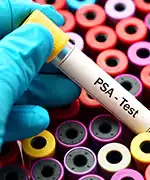
-
One in
eight American men will be
diagnosed with prostate cancer in his lifetime.
-
Specific
foods have been shown to
exert protective effects
against prostate cancer.
-
These
foods include walnuts,
cruciferous vegetables,
flaxseed, coffee, tomatoes,
green tea, and pomegranate,
supported by supplemental
vitamin D and boron.
|
Pomegranate
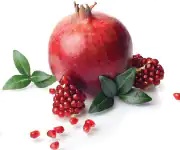 In a phase II
clinical trial of men with low-risk
prostate cancer, prostate tissue samples
from those who took pomegranate fruit
extract daily for one year contained
significantly lower levels of
biochemical markers associated with DNA
damage and prostate cancer.28 In a phase II
clinical trial of men with low-risk
prostate cancer, prostate tissue samples
from those who took pomegranate fruit
extract daily for one year contained
significantly lower levels of
biochemical markers associated with DNA
damage and prostate cancer.28
An earlier phase
II trial was undertaken in men who had
undergone surgery or radiation for
prostate cancer and who subsequently
showed rising PSA levels. Patients who
consumed eight ounces of pomegranate
juice daily had a delay in PSA doubling
time, the time it takes for PSA levels
to rise.29
Preclinical data
show that pomegranate components protect
against multiple aspects of prostate
cancer including growth, progression,
and spread, by inhibiting:30-35
-
Tumor cell
proliferation,
-
Cell
division,
-
Invasiveness,
-
Growth of new
blood vessels, and
-
Metastasis
(spread).
|
|
|
MORE DIETARY
TIPS
-
The
Mediterranean diet, which is rich in
whole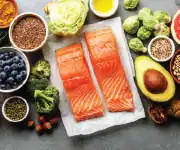 grains, legumes, vegetables, fruits, and nuts, has been associated with reduced
risk of prostate cancer and prostate
cancer-related death.52-54 grains, legumes, vegetables, fruits, and nuts, has been associated with reduced
risk of prostate cancer and prostate
cancer-related death.52-54
-
High fiber
intake is linked with reduced
prostate cancer aggressiveness.55
-
Eating low-glycemic
foods (foods low in sugars and
unhealthy carbs, as well as adequate
fiber, protein, and healthy fat) may
reduce prostate cancer risk.
-
Certain foods
have been associated with greater
risk of prostate cancer, including
eggs,56-58 milk,59-63 and
processed or overcooked meat.64-67
A review found
that three components of pomegranate
exhibit these inhibitory effects on
prostate cancer growth and spread:
luteolin, ellagic acid, and punicic
acid.36
Boron
A study found
that men with the highest boron intake
showed a 54% lower risk of prostate
cancer compared to those with the lowest
intake. In addition, they reported that
increased dietary boron intake was
associated with a decreased risk of
prostate cancer in a dose-response
manner. 37
In an animal
model, scientists orally administered
various concentrations of a
boron-containing solution. This resulted
in decreases in prostate tumor size by
25% to 38%. Remarkably, PSA levels
dropped by an astounding 86% to 89% in
the animals that received boron.38
These findings
suggest that supplemental boron may have
both preventive and therapeutic
effects—helping both to shrink prostate
tumors and to decrease levels of PSA.
Green Tea
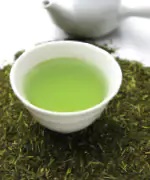 One clinical
trial found that green tea catechins
were 90% effective in preventing
prostate cancer in men with
pre-malignant lesions. The researchers
recruited 60 men, aged 45-75.
Thirty participants received 200 mg of
green tea catechins three times daily,
while the other 30 subjects received a
placebo. Biopsies were conducted at six
and 12 months.39 One clinical
trial found that green tea catechins
were 90% effective in preventing
prostate cancer in men with
pre-malignant lesions. The researchers
recruited 60 men, aged 45-75.
Thirty participants received 200 mg of
green tea catechins three times daily,
while the other 30 subjects received a
placebo. Biopsies were conducted at six
and 12 months.39
Remarkably, only
one man in this pre-malignant green tea
group was diagnosed with prostate
cancer, compared to nine men in the
control group who were diagnosed with
the disease. No significant side effects
or adverse reactions were reported. The
lead researcher concluded that “ 90% of
chemoprevention efficacy could be
obtained by [green tea catechin]
administration in men prone to
developing prostate cancer.”39
Green
tea polyphenols have also shown efficacy
as an adjunctive therapy. Prostate
cancer patients were given 1,300 mg of
green tea polyphenols, mostly EGCG,
prior to the time of radical
prostatectomy. They showed significant
reductions in PSA and other tumor
promoters such as vascular endothelial
growth factor.40
|
Vitamin D
Observational
studies have shown cancer risk
reductions of up to 50% based on higher
vitamin D status.41,42 People
with higher vitamin D levels have lower
odds of lethal prostate cancer.43
It’s difficult to
get enough from food sources and there
are risks with sun exposure. Scientists
have determined that supplemental doses
ranging from 5,000 IU to 8,000 IU daily
can bring blood levels of vitamin D up
to optimal ranges associated with
reduced risk for chronic disease.
Regular blood
testing is important to guide
adjustments to these doses to achieve
the maximum benefits.
Grapeseed
Grapeseed extract
induced apoptosis (programmed cell death)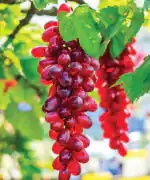 in prostate cancer cells.44 Grapeseed extract inhibited
prostate cancer growth and progression
in mice.45 in prostate cancer cells.44 Grapeseed extract inhibited
prostate cancer growth and progression
in mice.45
A study found
that men who supplemented with grapeseed
extract reduced their risk of prostate
cancer by 41%. Moreover, high 10-year
average use of grapeseed extract was
associated with a 62% reduction in
prostate cancer risk.46
Curcumin
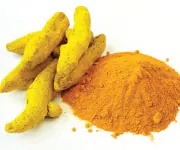 Curcumin induces
apoptosis (programmed cell death),
interferes with the spread of cancer
cells, and regulates inflammatory
responses. 47-50 Curcumin induces
apoptosis (programmed cell death),
interferes with the spread of cancer
cells, and regulates inflammatory
responses. 47-50
In one trial, 30
patients with castration-resistant
prostate cancer and rising PSA received
curcumin while undergoing treatment with
docetaxel and prednisone. Improved PSA
responses were noted in 59% of
participants.51
Summary
Specific foods
and drinks have been shown to be associated with a favorable influence on risk factors for, and mechanisms of prostate
cancer.
associated with a favorable influence on risk factors for, and mechanisms of prostate
cancer.
Making walnuts,
cruciferous vegetables, flaxseed, and
other plant foods a consistent part of a
healthy diet—further supported by
supplemental vitamin D, boron and other
nutrients—could potentially save lives
and spare men the side effects of
conventional treatments.
Consider cutting
back or avoiding red meat, especially
processed meat to further reduce risk of
prostate and other cancers.
|
|
|
References
-
Available at:
https://www.cancer.org/cancer/prostate-cancer/about/key-statistics.html.
Accessed May 31, 2022.
-
Nouri-Majd S,
Salari-Moghaddam A, Aminianfar A, et
al. Association Between Red and
Processed Meat Consumption and Risk
of Prostate Cancer: A Systematic
Review and Meta-Analysis. Front Nutr.
2022;9:801722.
-
Oczkowski M,
Dziendzikowska K, Pasternak-Winiarska
A, et al. DietaryFactors and
Prostate Cancer Development,
Progression, and Reduction.
Nutrients. 2021 Feb 3;13(2):496.
-
Catanzaro E,
Greco G, Potenza L, et al. Natural
Products to Fight Cancer: A Focus on
Juglans regia. Toxins (Basel). 2018
Nov 14;10(11).
-
Reiter RJ,
Tan DX, Manchester LC, et al. A
walnut-enriched diet reduces the
growth of LNCaP human prostate
cancer xenografts in nude mice.
Cancer Invest. 2013
Jul;31(6):365-73.
-
Sanchez-Gonzalez C, Ciudad CJ, Noe
V, et al. Walnut polyphenol
metabolites, urolithins A and B,
inhibit the expression of the
prostate-specific antigen and the
androgen receptor in prostate cancer
cells. Food Funct. 2014
Nov;5(11):2922-30.
-
Richman EL,
Carroll PR, Chan JM. Vegetable and
fruit intake after diagnosis and
risk of prostate cancer progression.
Int J Cancer. 2012 Jul
1;131(1):201-10.
-
Kucera R,
Pecen L, Topolcan O, et al. Prostate
cancer management: long-term
beliefs, epidemic developments in
the early twenty-first century and
3PM dimensional solutions. EPMA J.
2020 Sep;11(3):399-418.
-
Liu B, Mao Q,
Cao M, et al. Cruciferous vegetables
intake and risk of prostate cancer:
a meta-analysis. Int J Urol. 2012
Feb;19(2):134-41.
-
Abdull Razis
AF, Noor NM. Cruciferous vegetables:
dietary phytochemicals for cancer
prevention. Asian Pac J Cancer Prev.
2013;14(3):1565-70.
-
Beaver LM, Yu
TW, Sokolowski EI, et al. 3,3’-Diindolylmethane,
but not indole-3-carbinol, inhibits
histone deacetylase activity in
prostate cancer cells. Toxicol Appl
Pharmacol. 2012 Sep
15;263(3):345-51.
-
Yu C, Gong
AY, Chen D, et al. Phenethyl
isothiocyanate inhibits androgen
receptor-regulated transcriptional
activity in prostate cancer cells
through suppressing PCAF. Mol Nutr
Food Res. 2013 Oct;57(10):1825-33.
-
Su X, Jiang
X, Meng L, et al. Anticancer
Activity of Sulforaphane: The
Epigenetic Mechanisms and the Nrf2
Signaling Pathway. Oxid Med Cell
Longev. 2018;2018:5438179.
-
Wong CP, Hsu
A, Buchanan A, et al. Effects of
sulforaphane and 3,3’-diindolylmethane
on genome-wide promoter methylation
in normal prostate epithelial cells
and prostate cancer cells. PLoS One.
2014;9(1):e86787.
-
Guertin MH,
Robitaille K, Pelletier JF, et al.
Effects of concentrated long-chain
omega-3 polyunsaturated fatty acid
supplementation before radical
prostatectomy on prostate cancer
proliferation, inflammation, and
quality of life: study protocol for
a phase IIb, randomized,
double-blind, placebo-controlled
trial. BMC Cancer. 2018 Jan
10;18(1):64.
-
Kezimana P,
Dmitriev AA, Kudryavtseva AV, et al.
Secoisolariciresinol Diglucoside of
Flaxseed and Its Metabolites:
Biosynthesis and Potential for
Nutraceuticals. Front Genet.
2018;9:641.
-
Mali AV,
Padhye SB, Anant S, et al.
Anticancer and antimetastatic
potential of enterolactone:
Clinical, preclinical and
mechanistic perspectives. Eur J
Pharmacol. 2019 Jun 5;852:107-24.
-
Lu Y, Zhai L,
Zeng J, et al. Coffee consumption
and prostate cancer risk: an updated
meta-analysis. Cancer Causes
Control. 2014 May;25(5):591-604.
-
Wilson KM,
Kasperzyk JL, Rider JR, et al.
Coffee consumption and prostate
cancer risk and progression in the
Health Professionals Follow-up
Study. J Natl Cancer Inst. 2011 Jun
8;103(11):876-84.
-
Applegate CC,
Rowles JL, 3rd, Erdman JW, Jr. Can
Lycopene Impact the Androgen Axis in
Prostate Cancer?: A Systematic
Review of Cell Culture and Animal
Studies. Nutrients. 2019 Mar
15;11(3):633.
-
Assar EA,
Vidalle MC, Chopra M, et al.
Lycopene acts through inhibition of
IkappaB kinase to suppress NF-kappaB
signaling in human prostate and
breast cancer cells. Tumour Biol.
2016 Jul;37(7):9375-85.
-
Obermuller-Jevic UC, Olano-Martin E,
Corbacho AM, et al. Lycopene
inhibits the growth of normal human
prostate epithelial cells in vitro.
J Nutr. 2003 Nov;133(11):3356-60.
-
Chen P, Zhang
W, Wang X, et al. Lycopene and Risk
of Prostate Cancer: A Systematic
Review and Meta-Analysis. Medicine
(Baltimore). 2015 Aug;94(33):e1260.
-
Wang Y,
Jacobs EJ, Newton CC, et al.
Lycopene, tomato products and
prostate cancer-specific mortality
among men diagnosed with
nonmetastatic prostate cancer in the
Cancer Prevention Study II Nutrition
Cohort. Int J Cancer. 2016 Jun
15;138(12):2846-55.
-
Rowles JL,
3rd, Ranard KM, Applegate CC, et al.
Processed and raw tomato consumption
and risk of prostate cancer: a
systematic review and dose-response
meta-analysis. Prostate Cancer
Prostatic Dis. 2018
Sep;21(3):319-36.
-
Arballo J,
Amengual J, Erdman JW, Jr. Lycopene:
A Critical Review of Digestion,
Absorption, Metabolism, and
Excretion. Antioxidants (Basel).
2021 Feb 25;10(3).
-
Available at:
https://www.sciencedirect.com/topics/medicine-and-dentistry/lycopene.
Accessed June 30, 2022.
-
Jarrard D,
Filon M, Huang W, et al. A phase II
randomized placebo-controlled trial
of pomegranate fruit extract in men
with localized prostate cancer
undergoing active surveillance.
Prostate. 2021 Jan;81(1):41-9.
-
Pantuck AJ,
Leppert JT, Zomorodian N, et al.
Phase II study of pomegranate juice
for men with rising
prostate-specific antigen following
surgery or radiation for prostate
cancer. Clin Cancer Res. 2006 Jul
1;12(13):4018-26.
-
Naiki-Ito A,
Chewonarin T, Tang M, et al. Ellagic
acid, a component of pomegranate
fruit juice, suppresses
androgen-dependent prostate
carcinogenesis via induction of
apoptosis. Prostate. 2015
Feb;75(2):151-60.
-
Livingstone
TL, Beasy G, Mills RD, et al. Plant
Bioactives and the Prevention of
Prostate Cancer: Evidence from Human
Studies. Nutrients. 2019 Sep
18;11(9).
-
Wang L, Ho J,
Glackin C, et al. Specific
pomegranate juice components as
potential inhibitors of prostate
cancer metastasis. Transl Oncol.
2012 Oct;5(5):344-55.
-
Deng Y, Li Y,
Yang F, et al. The extract from
Punica granatum (pomegranate) peel
induces apoptosis and impairs
metastasis in prostate cancer cells.
Biomed Pharmacother. 2017
Sep;93:976-84.
-
Turrini E,
Ferruzzi L, Fimognari C. Potential
Effects of Pomegranate Polyphenols
in Cancer Prevention and Therapy.
Oxid Med Cell Longev.
2015;2015:938475.
-
Paller CJ,
Pantuck A, Carducci MA. A review of
pomegranate in prostate cancer.
Prostate Cancer Prostatic Dis. 2017
Sep;20(3):265-70.
-
Wang L,
Martins-Green M. Pomegranate and its
components as alternative treatment
for prostate cancer. Int J Mol Sci.
2014 Aug 25;15(9):14949-66.
-
Cui Y, Winton
MI, Zhang ZF, et al. Dietary boron
intake and prostate cancer risk.
Oncol Rep. 2004 Apr;11(4):887-92.
-
Gallardo-Williams MT, Chapin RE,
King PE, et al. Boron
supplementation inhibits the growth
and local expression of IGF-1 in
human prostate adenocarcinoma (LNCaP)
tumors in nude mice. Toxicol Pathol.
2004 Jan-Feb;32(1):73-8.
-
Bettuzzi S,
Brausi M, Rizzi F, et al.
Chemoprevention of human prostate
cancer by oral administration of
green tea catechins in volunteers
with high-grade prostate
intraepithelial neoplasia: a
preliminary report from a one-year
proof-of-principle study. Cancer
Res. 2006 Jan 15;66(2):1234-40.
-
McLarty J,
Bigelow RL, Smith M, et al. Tea
polyphenols decrease serum levels of
prostate-specific antigen,
hepatocyte growth factor, and
vascular endothelial growth factor
in prostate cancer patients and
inhibit production of hepatocyte
growth factor and vascular
endothelial growth factor in vitro.
Cancer Prev Res (Phila). 2009
Jul;2(7):673-82.
-
Garland CF,
Gorham ED, Mohr SB, et al. Vitamin D
and prevention of breast cancer:
pooled analysis. J Steroid Biochem
Mol Biol. 2007 Mar;103(3-5):708-11.
-
Gorham ED,
Garland CF, Garland FC, et al.
Vitamin D and prevention of
colorectal cancer. J Steroid Biochem
Mol Biol. 2005 Oct;97(1-2):179-94.
-
Shui IM,
Mucci LA, Kraft P, et al. Vitamin
D-related genetic variation, plasma
vitamin D, and risk of lethal
prostate cancer: a prospective
nested case-control study. J Natl
Cancer Inst. 2012 May
2;104(9):690-9.
-
Kaur M,
Agarwal R, Agarwal C. Grape seed
extract induces anoikis and caspase-mediated
apoptosis in human prostate
carcinoma LNCaP cells: possible role
of ataxia telangiectasia mutated–p53
activation. Molecular Cancer
Therapeutics. 2006;5(5):1265-74.
-
Raina K,
Singh RP, Agarwal R, et al. Oral
Grape Seed Extract Inhibits Prostate
Tumor Growth and Progression in
TRAMP Mice. Cancer Research.
2007;67(12):5976-82.
-
Brasky TM,
Kristal AR, Navarro SL, et al.
Specialty supplements and prostate
cancer risk in the VITamins and
Lifestyle (VITAL) cohort. Nutr
Cancer. 2011;63(4):573-82.
-
Aggarwal BB,
Sundaram C, Malani N, et al.
Curcumin: the Indian s olid gold.
Adv Exp Med Biol. 2007;595:1-75.
-
Khan N,
Adhami VM, Mukhtar H. Apoptosis by
dietary agents for prevention and
treatment of prostate cancer. Endocr
Relat Cancer. 2010 Mar;17(1):R39-52.
-
Teiten MH,
Gaascht F, Eifes S, et al.
Chemopreventive potential of
curcumin in prostate cancer. Genes
Nutr. 2010 Mar;5(1):61-74.
-
Plummer SM,
Holloway KA, Manson MM, et al.
Inhibition of cyclo-oxygenase 2
expression in colon cells by the
chemopreventive agent curcumin
involves inhibition of NF-kappaB
activation via the NIK/IKK
signalling complex. Oncogene. 1999
Oct 28;18(44):6013-20.
-
Mahammedi H,
Planchat E, Pouget M, et al. The New
Combination Docetaxel, Prednisone
and Curcumin in Patients with
Castration-Resistant Prostate
Cancer: A Pilot Phase II Study.
Oncology. 2016;90(2):69-78.
-
Capurso C,
Vendemiale G. The Mediterranean Diet
Reduces the Risk and Mortality of
the Prostate Cancer: A Narrative
Review. Front Nutr. 2017;4:38.
-
Ferris-Tortajada
J, Berbel-Tornero O, Garcia-Castell
J, et al. [Dietetic factors
associated with prostate cancer:
protective effects of Mediterranean
diet]. Actas Urol Esp. 2012
Apr;36(4):239-45.
-
Urquiza-Salvat N, Pascual-Geler M,
Lopez-Guarnido O, et al. Adherence
to Mediterranean diet and risk of
prostate cancer. Aging Male. 2019
Jun;22(2):102-8.
-
Tabung F,
Steck SE, Su LJ, et al. Intake of
grains and dietary fiber and
prostate cancer aggressiveness by
race. Prostate Cancer.
2012;2012:323296.
-
Richman EL,
Kenfield SA, Stampfer MJ, et al.
Egg, red meat, and poultry intake
and risk of lethal prostate cancer
in the prostate-specific
antigen-era: incidence and survival.
Cancer Prev Res (Phila). 2011
Dec;4(12):2110-21.
-
Aune D, De
Stefani E, Ronco AL, et al. Egg
consumption and the risk of cancer:
a multisite case-control study in
Uruguay. Asian Pac J Cancer Prev.
2009;10(5):869-76.
-
Wilson KM,
Mucci LA, Drake BF, et al. Meat,
Fish, Poultry, and Egg Intake at
Diagnosis and Risk of Prostate
Cancer Progression. Cancer Prev Res
(Phila). 2016 Dec;9(12):933-41.
-
Aune D,
Navarro Rosenblatt DA, Chan DS, et
al. Dairy products, calcium, and
prostate cancer risk: a systematic
review and meta-analysis of cohort
studies. Am J Clin Nutr. 2015
Jan;101(1):87-117.
-
Song Y,
Chavarro JE, Cao Y, et al. Whole
milk intake is associated with
prostate cancer-specific mortality
among U.S. male physicians. J Nutr.
2013 Feb;143(2):189-96.
-
Steck SE,
Omofuma OO, Su LJ, et al. Calcium,
magnesium, and whole-milk intakes
and high-aggressive prostate cancer
in the North Carolina-Louisiana
Prostate Cancer Project (PCaP). Am J
Clin Nutr. 2018 May
1;107(5):799-807.
-
Tat D,
Kenfield SA, Cowan JE, et al. Milk
and other dairy foods in relation to
prostate cancer recurrence: Data
from the cancer of the prostate
strategic urologic research endeavor
(CaPSURE). Prostate. 2018
Jan;78(1):32-9.
-
Downer MK,
Batista JL, Mucci LA, et al. Dairy
intake in relation to prostate
cancer survival. Int J Cancer. 2017
May 1;140(9):2060-9.
-
Joshi AD,
Corral R, Catsburg C, et al. Red
meat and poultry, cooking practices,
genetic susceptibility and risk of
prostate cancer: results from a
multiethnic case-control study.
Carcinogenesis. 2012
Nov;33(11):2108-18.
-
Punnen S,
Hardin J, Cheng I, et al. Impact of
meat consumption, preparation, and
mutagens on aggressive prostate
cancer. PLoS One. 2011;6(11):e27711.
-
Available at:
https://www.cancer.gov/about-cancer/causes-prevention/risk/diet/cooked-meats-fact-sheet.
Accessed June 28, 2022.
-
John EM,
Stern MC, Sinha R, et al. Meat
consumption, cooking practices, meat
mutagens, and risk of prostate
cancer. Nutr Cancer.
2011;63(4):525-37.
|
|
|
|